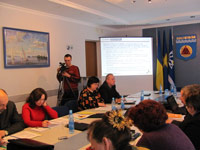
IBSER Conducts Financial Training Workshops in
On 28 February 2011 IBSER launched a series of trainings on how to use innovative financial mechanisms to implement infrastructure development projects. This series of workshops will be held in five pilot cities selected by IBSER and the Municipal Heating Reform Project (MHR/USAID) and started in
The 25 trainees from the Komsomolsk City Council included department heads of the Executive Committee, specialists of line directorates and departments of the City Council.
The event was inaugurated by Komsomolsk Mayor Serhiy Suprun, who welcomed those present and remarked on high relevance of the training, as it would allow the participants to learn the practical aspects of using innovative financial mechanisms, in particular, such tools as public-private partnership.
The training focused on how to ensure coordination between strategic documents and the development budget on the basis of Performance Program Budgeting, sources of financing for development plans and investment projects, namely the better use of funds generated by energy savings, borrowing practices, provision of local guarantees, and pooling the funds of local governments and private investors together by using public-private partnership mechanisms. Special focus was made on the latest changes in the legislative and regulatory framework on the above issues.
The workshop participants had an opportunity to practice their newly acquired knowledge and skills by implementing practical assignments that called for providing financial justification for an investment project. the participants suggested real potential projects and the most interesting and relevant for subsequent implementation in
Implementing such projects will make it possible to attract the funds, expertise, and capacity of the private sector to address the pressing economic and social problems that lie within the scope of local government responsibilities, reducing the risks both for the public and private partner.

 Glyanec
Glyanec